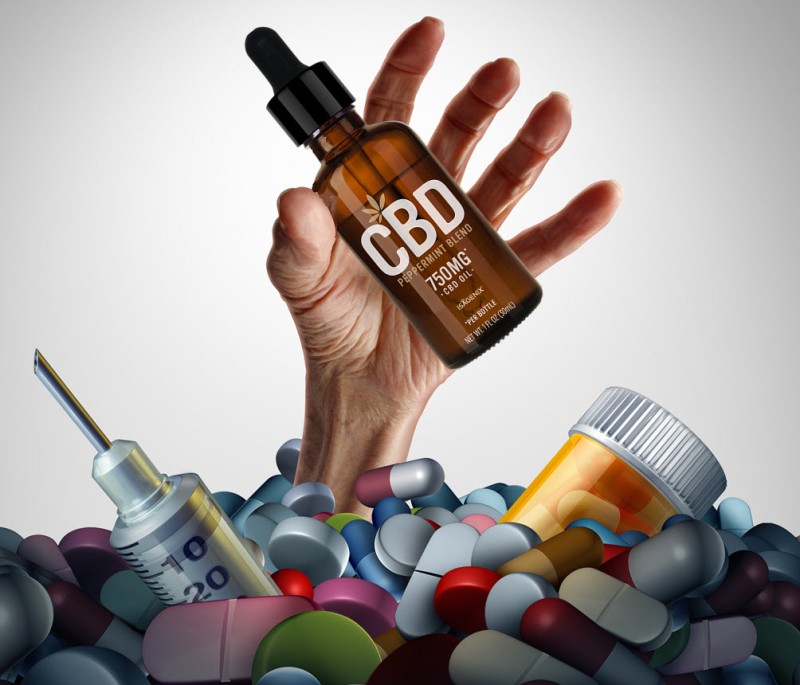
Ananda Scientific Inc., a biotech pharma firm in the U.S, recently announced that it would soon commence a study on the application of CBD-derived drugs as a medicinal alternative for opioid-use disorder. This announcement came a few days after the company's proposal was approved by the Food and Drug Administration (FDA).
The FDA approved the pharma's CBD-based Nantheia ATL5, an Investigational New Drug (IND), to be used as a potential treatment to cure or manage opioid use disorder.
The Epidemic of Opioid Use Disorder
Both Canada and the United States are facing a massive opioid epidemic. Both governments have also approved dozens of research projects to look into potential treatment options for managing opioid use disorder.
In the past two decades, at least 800,000 Americans have died from drug overdoses, many of which can be traced to opioids. From 2019 to this day, about 65% of fatal drug ODs were due to opioids like heroin, synthetic opioids, and prescription opioids. The figure is still rising gradually.
Through decades of research, scientists have developed various treatment options, none of which seems to have a long-lasting effect, as relapse still remains as pervasive as ever. A few of the FDA-approved opioid treatment medications have efficiently eased the grimness of withdrawal symptoms. They have also helped in preventing relapses. The downside is that some of these medications come with their own risks, and they do not have the same impact on all patients. Some of these traditional opiate replacement therapies like methadone and buprenorphine are primarily inaccessible due to legal and logistical constraints.
Cannabis-based medical treatments are one of the novel alternatives being looked into for opiate use disorder therapies. Ananda Scientific Inc. has been able to establish that CBD could help in lessening the severity of opiate use disorder.
Details about Ananda's Study
The new clinical trial will take place at the Jane and Terry Semel Institute for Neuroscience and Human Behavior at the University of California, Los Angeles. According to the press release, the National Institute on Drug Abuse is funding the program, which has been slated to run for nine weeks.
Sohail R. Zaidi wrote that the new study would go a long way toward boosting the clinical development efforts targeted at opioid addiction. Non-addictive therapy is the best option for patients suffering from opioid use disorder, and this new drug, Nantheia, could be it. The objective of the research is to determine the potential safety and impact of CBD as an alternative therapy for patients with opioid use disorders. It would replace existing treatments like buprenorphine and naloxone.
The summary of the proposal indicated that 60 volunteers would be recruited from Los Angeles' Tarzana Treatment Center. The Center manages its patients with buprenorphine and naloxone therapy.
The trial's lead investigators are Richard De La Garza, Ph.D., Professor of Psychiatry and Biobehavioral Science and Molecular and Medical Pharmacology at the same Institute, Edythe London.
About Nantheia, ATL 5.
Nantheia is a soft-gel capsule that is ingested orally. Each pill contains 100 mg of CBD. Ananda's Liquid Structure technology, licensed by Lyotropic Delivery Systems, has contributed immensely to the production of the drug. The delivery system ensures that the CBD effects are enhanced and stabilized when ingested. It has also helped in creating a mechanism to facilitate voluntary opioid sparing through cannabidiol therapeutics.
The recent approval by the FDA is the fourth IND approval for the Nantheir product line. Zaidi says that these approvals are in line with the company's vision of making CBD one of the critical treatments for opioid use disorder. The drug opens up a new possibility for CBD therapeutics to be used to ameliorate opioid intake in patients who are battling opioid addictions.
The development of this crucial and promising therapeutic alternative will positively affect the lives of millions of people in North America suffering from opiate use disorder. Zaidi added that the welfare of these people would be improved by advancing the applications for the Nantheia medication line.
In a press release, Dr. London said that she was optimistic about the collaboration with Ananda. She added that this clinical trial is a start in resolving the opiate epidemic ravaging North America. The trial would begin as soon as the volunteers are recruited. Now that the IND has been approved, there is very little reason to stall the advancement of this trial.
Analgesics with CBD-Derived Medications
Opioids and cannabis are primarily used as analgesics. Both function remarkably well for relieving chronic pain. Since the start of medical cannabis programs in states across the U.S. and Canada, statistics show that patients prefer the use of cannabis to opioids. This caused a 40% reduction in the use of opioids. Fewer patients report side effects after using cannabis medications than their opioid counterparts. Little research has produced reliable literature to show why cannabis consistently shows better pain relief than opioid doses. Fewer has also established why cannabis could be a potential treatment for managing opioid addictions.
Ananda Scientific Inc. is one of the few companies linking with research institutes to evaluate the medical benefits of cannabinoids. The company is one of the pioneers of high-profile clinical studies using impressive delivery technologies to make cannabis compounds more bioavailable. Many of the company's nutraceuticals are available in the US, UK, and Canada. There are expansion plans in the works to introduce Africa, Australia, Europe, and China to the wonders of cannabis-derived medications.
Bottom Line
Ananda and UCLA are working on a drug that could significantly lower the number of opioid-related deaths in the United States, Canada, and the rest of the world. While primary care clinicians work each day tirelessly to identify and treat people with opioid use disorder, it is commendable that a clinical trial is being conducted to profer more efficient, long-lasting treatment options to resolve opioid addiction cases. The FDA should also try to approve other clinical trials exploring the use of cannabis as an alternative or adjunct treatment for opioid use disorder. This is better than waiting for the Ananda team to provide solutions.






